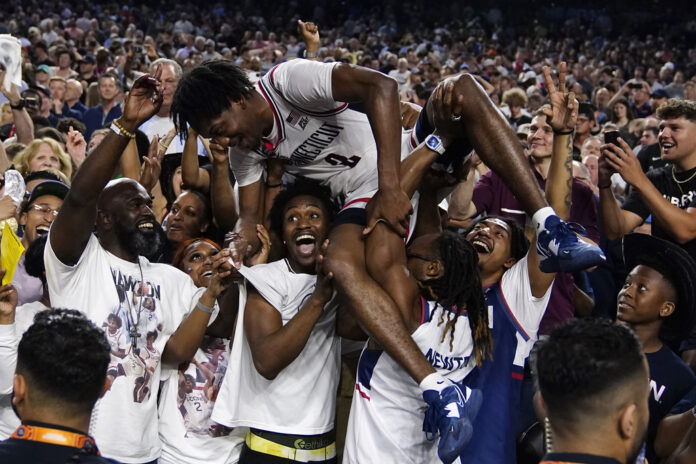
By EDDIE PELLS, Associated Press
HOUSTON (AP) — Thirty years ago, a group of disrupters with baggy shorts and black socks changed college basketball as we know it, and took a good slice of American culture along for the ride.
Those freshmen known as the Fab Five ended up one win short of the title, which is exactly where San Diego State — a team coached by a former Fab Five assistant, Brian Dutcher — finds itself in 2023 during another transformative period in college hoops.
The Aztecs (32-6) themselves certainly aren’t trying to deliver change to the game or the culture when they face UConn (30-8) in the title game Monday.
But the fact that they’re here — a team with Michigan bloodlines that was forged quickly through the newly liberated transfer portal and enriched by opportunities that have sprung from name, image and likeness deals — speaks volumes about where those Fab Five superstars were trying to take the game three decades ago.
“We got to college and started understanding the hypocrisy in the game, with the schools making millions and us sitting around poor as hell,” said Fab Five guard Ray Jackson. “We wanted to change the dynamics of that, get the athletes feeling empowered a little more.”
One of the greatest ironies is that the coach who essentially built the 21st-century version of San Diego State is Dutcher’s longtime boss at both Michigan and SDSU, Steve Fisher. Fisher made his way to the West Coast after losing his job at Michigan in the wake of one of the most complex and sordid illicit-benefits scandals in NCAA history.
In essence, the coach, who retired and handed over the SDSU reins to Dutcher in 2017, got caught up in a series of events that, frankly, wouldn’t be frowned upon nearly as harshly today. Back then, it was a shady booster with gambling ties trying to funnel money to players. These days, sports gambling is legal in many states (the NCAA brought the Sweet 16 to Las Vegas for the first time last week), while everyone from car dealers to social media conglomerates pay players in the open.
Fisher is in Houston this week, hanging with his son, Mark, a special assistant for the fifth-seeded Aztecs who has ALS.
“I had the ability to close my eyes and dream, and dream of this, to be honest with you,” Fisher said earlier this week.
A Final Four wasn’t so much a dream as an expectation for the Fab Five — Jackson, Jalen Rose, Chris Webber, Juwan Howard and Jimmy King — who, in many opinions, remain the most electric single recruiting class in college history.
They showed up at Michigan in 1991 and made not one but two appearances in the national title game. They got blown out by Duke 1992 with Bobby Hurley, the brother of current UConn coach Dan Hurley, doing some of the damage. In 1993, it was Webber’s costly timeout when the Wolverines didn’t have one that made the difference in a close loss to North Carolina.
So, no title, but the Fab Five ended up with more — namely, they opened the world to embracing the style they brought to the playground, while making an indelible statement about the way they felt college players should be treated.
“It could get frustrating and un-fun at times,” Jackson said. “We just wanted to be transcendent. We wanted to bring the culture we came from, which was street basketball, community basketball, and bring that fun back to game.”
They also ended up as successes after college, building careers in worlds as diverse as nonprofit, finance, TV and even coaching; Howard just finished his fourth season as coach of the Wolverines.
“Isn’t that the end goal, when the ball stops bouncing, you’re doing something that’s productive with your life?” said Dutcher, who has heard from everyone in the group during his program’s first run to the cusp of a title.
In many ways, Dutcher’s group came together in the polar opposite fashion as the Fab Five. San Diego State’s starters came from different places at different times. They could separate themselves from the Michigan greats in another way if they can win the title that eluded Dutcher & Co. for all those years.
It’s a tall task.
SDSU is coming off an emotionally and physically taxing 72-71 win over Florida Atlantic on Saturday night. When Lamont Butler hit the game-winner at the buzzer, it marked the first time in Final Four history that a buzzer-beater took a team from trailing to a victory.
In addition to the bounce back, there is the opponent. Nobody has come within double digits of fourth-seeded UConn during the tournament. Adama Sanogo has averaged 20 points and nearly 10 rebounds a game over the stretch for the Huskies.
But Jackson, for one, insists this is far from a lost cause. He says Dutcher is a master at “breaking down film, knowing game strategy and preparing for a short turnaround.”
“I remember sitting in film sessions and going crazy, laughing at some team and thinking, we’re going to beat their” butt, Jackson said. “Dutch is running film back and saying, ‘I’m not kidding, these guards are good, and if you don’t take this seriously, they’re going to beat your’” butt.
That, Jackson said, was key all those years ago to the lasting success of a group of cocky teenagers whose impact went well beyond how they fared against the next day’s opponent.
___
AP Sports Writer Larry Lage contributed to this report.


